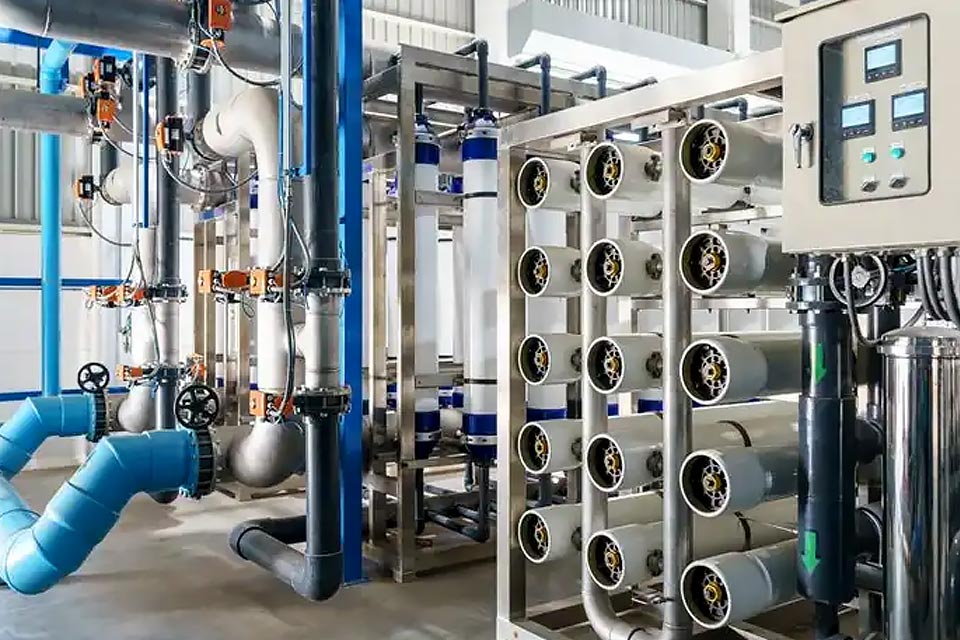

MULTI-BENEFIT-DESALINATION: A TRANSFORMATIVE SOLUTION:
Multi-benefit desalination plants represent a significant advancement in sustainable resource management, offering more than just a stable and abundant freshwater supply from our oceans. By integrating advanced technologies, these plants can deliver substantial added value.
Key Advantages:
- Clean Energy Production: Coupling desalination with Proton Exchange Membrane (PEM) technology enables hydrogen production, utilizing renewable energy and desalinated water to contribute to a clean and economically viable energy mix.
- Enhanced Food Security: Desalinated water can irrigate barren lands, transforming them into fertile agricultural regions, thereby bolstering local and global food security.
- Resource Recovery: These plants facilitate the recovery of valuable minerals from brine by-products, including:
- Major Components: Sodium (Na), Chlorine (Cl), Magnesium (Mg), Calcium (Ca), Potassium (K), and Bromine (Br).
- Valuable Trace Elements: Lithium (Li), Strontium (Sr), Rubidium (Rb), and Boron (B). Notably, Boron is critical for high-strength permanent magnets (NdFeB) used in electric vehicles, generators, MRI machines, and numerous other applications.
- Environmental Optimization: Multi-benefit plants can utilize waste heat and minimize environmental impacts through optimized brine discharge.
- Element presence: It is important to remember that seawater and therefore desalination brine contains almost all elements to some degree.
By simultaneously addressing water scarcity, energy needs, food security, and resource recovery, multi-benefit desalination plants offer a comprehensive and sustainable solution, representing a high-tech approach to critical global challenges.
VIRTUALLY LIMITLESS WATER SUPPLY: UNLOCKING OCEAN POTENTIAL
The oceans represent a virtually limitless reservoir, offering a sustainable solution to global water scarcity. Desalination plants harness this abundant resource, transforming seawater into freshwater to meet critical needs. This ensures a reliable water supply, particularly vital during droughts and emergencies. By unlocking the ocean's potential, we can secure water for human consumption, drive sustainable energy production, revitalize barren lands through irrigation, and support crucial ecosystem restoration.

SUSTAINABLE ENERGY PRODUCTION:
Desalination plants are key to sustainable energy production.
When powered by renewable sources—solar, wind, or hydroelectric—they operate with minimal environmental impact. Crucially, desalinated water is essential for producing green hydrogen via Proton Exchange Membrane (PEM) electrolysis, a carbon-free process.
This hydrogen can fuel industries, transportation, and energy grids, accelerating the transition to a clean energy future.
Furthermore, repurposing waste heat from desalination enhances efficiency, creating a closed-loop system.
Integrating energy generation with water production transforms these plants into multi-functional hubs for both resource and energy sustainability. This synergy also extends to food security, as desalinated water can revitalize barren lands for agriculture.

ADDRESSING GLOBAL CHALLENGES: THE POWER OF MULTI-BENEFIT DESALINATION
Desalination offers a transformative solution to critical global challenges beyond disaster prevention. By leveraging ocean resources, we can:
- Mitigate Rising Sea Levels: Convert seawater into freshwater, balancing the impact of rising oceans through strategic land irrigation and utilization.
- Drive Sustainable Energy Production: Integrate desalination with renewable energy (like PEM electrolysis for green hydrogen) to fuel clean energy transitions.
- Enhance Global Food Security: Transform arid lands into fertile agricultural regions, ensuring food security in water-scarce areas.
- Restore Ecosystems: Rejuvenate dry ecosystems, restoring biodiversity and environmental health through consistent water availability.
- Provide Clean Drinking Water: Deliver safe, reliable drinking water to urban and rural populations, improving health and quality of life.
A CALL TO ACTION: INVESTING IN RESILIENCE
Nations must recognize desalination's potential. This multi-benefit approach addresses water scarcity, mitigates disasters, and strengthens global energy and food stability. The oceans offer a virtually limitless water supply, adaptable for diverse needs.
CONCLUSION: A HOLISTIC SOLUTION FOR A SUSTAINABLE FUTURE
Multi-benefit desalination plants are more than water purification tools; they are cornerstones of resilience and sustainability. Integrating these plants into our resource management strategies offers a holistic approach to address interconnected challenges:
- Climate Change Mitigation: Counter rising sea levels by converting seawater into usable freshwater.
- Sustainable Energy: Generate clean energy through integrated renewable technologies.
- Food Security: Expand agricultural capacity in arid regions.
- Ecological Restoration: Revitalize degraded lands and ecosystems.
By investing in these innovative systems, we can secure essential resources, restore ecological balance, and build resilience against the uncertainties of a changing climate.

